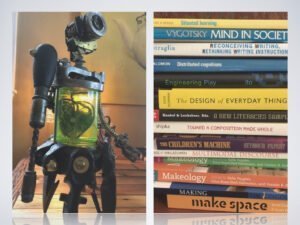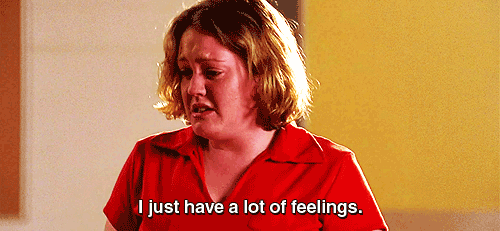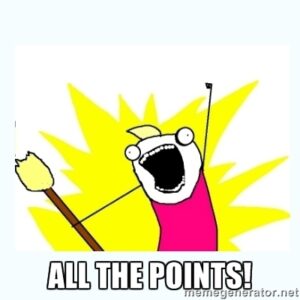
Syllabus
We acknowledge and are mindful that CSU, Chico stands on lands that were originally occupied by the first people of this area, and we recognize the Mechoopda and their distinctive spiritual relationship with this land and the waters that run through campus. We are humbled that our campus resides upon sacred lands that once sustained the Mechoopda people for centuries.
English 490W-02: Liberal Studies Capstone
Spring 2021: meets Tuesdays, 2:00-4:50 via Zoom (I’ll send Zoom link to your Wildcat email)
Our Course Website: http://kimjaxon.com/edte490
 Dr. Kim Jaxon
Dr. Kim Jaxon
Office: like everyone right now…in my home.
Office hours: I check email all the time, so feel free to email. If we can’t resolve something over email, then we can find a time that works for you to chat via Zoom.
Email: kjaxon@csuchico.edu (best way to reach me)
Email for sharing Google Docs: kjaxon@mail.csuchico.edu
Twitter: @drjaxon
Course Description
Welcome to the Liberal Studies Capstone! This course is the culminating learning experience in the Liberal Studies major. The Senior Capstone requires students to demonstrate and synthesize their learning across the disciplines through a well-defined research paper. In this course, emerging teachers/scholars will understand and utilize some of the research approaches and methodologies commonly used in critical educational research.
TL;DR: we’re doing research together on educational problems of your choice, we’ll meet every Tuesday from 2:00-4:50 in a virtual working group (*see note about participation below), and there are no books to buy. To get situated, check out the Getting Started page. For the longer version of the syllabus, including the note about participation, keep reading below. 😉
 Liberal Studies Program Mission
Liberal Studies Program Mission
The CSU, Chico Liberal Studies Program ensures academic rigor in preparing students who will become the educators, mentors and leaders in our nation’s schools and wider society. Academic excellence and commitment to the values of diversity, anti-oppressive practices, community activism and collaboration distinguish our program graduates. Graduates of the Liberal Studies Program are transformative change agents prepared to educate students to be active stewards of our democracy. Liberal Studies students value learning as a transformative, socially-mediated process that requires critical inquiry, reflection, collaboration across difference, and knowledge of the interconnectedness and relationships among the disciplines, society and our own agency. They use their new disciplinary knowledge to work toward a more just and equitable society as informed professional educators.
In our capstone course, we will reflect on the research processes you’ve encountered in your college career:
- Identifying a problem of practice and a rationale for its investigation
- Reviewing the literature concerning this problem
- Identifying data needed to help address the problem
- Collecting data/consulting community partners to understand this problem
- Interpreting the results, drawing implications and giving recommendations for future action
And, perhaps you’ll be introduced to new ways of doing research:
- Descriptive types: survey, historical, content (document) analysis, qualitative/ethnography
- Emancipatory types: action and participatory action research
Course Rationale
The purpose of this class is to provide you an opportunity to identify a problem of practice in education, in classrooms/schools and/or communities (think policy, socio-historical issues, curriculum, classroom pedagogy, disciplinary policies, tracking, etc), read deeply in this area of interest, conduct your own research, and then take action to recommend solutions to the problem you posed. You will draw upon critical theory from a range of disciplines that supports anti-oppressive education. This work will challenge traditional forms of research that have historically excluded community-based or local knowledge and participation and that maintain inequitable power dynamics between researchers and participants. To this end, we will leverage our collective knowledge by engaging in research projects that lead teachers, schools, students/communities toward personal and systemic social transformation.
Objectives/Student Learning Outcomes
Upon successful completion of this course, students will:
- Demonstrate knowledge of effective verbal, nonverbal, and media communication techniques.
- Analyze, summarize, and reason from evidence (i.e., interviews, document analysis, literature reviews, curricula, policies, laws, podcasts, etc.)
- Analyze disciplinary (Kinesiology, Science, VPA, Math, English, Human Development, History/Social Science) problems in the field of education (curriculum, pedagogy, policy, or assessment), apply principles of critical theory, present implications and make recommendations for taking action to forward a more just and equitable society.
- Write an inquiry paper and present these findings in a Capstone presentation demonstrating fluency with academic writing and APA (American Psychological Association) format in research paper writing.
- Demonstrate basic knowledge of how one or more of the Liberal Studies disciplines is/are related to such issues (including by not limited to) as educational policy, pedagogy, curriculum, assessment, socio-historical positioning, school culture.
Materials & Access
- Readings are available as links in a platform called Perusall; this will allow us to share annotations. Nothing to buy. 😉
- Y’all will need to be on the internet. Reach out if I can help in any way to connect you to campus’ resources for devices and wifi access. Happy to help.
- We’ll use two platforms for our work together:
- Currents Community: Currents is the place where we’ll share our research and write. You’ll need to log in with your Chico State credentials since Currents is not available for single gmail accounts. Check out the Getting Started page above for information about how to join.
- Persusall: Perusall allows us to read together and create shared annotations. Once you create an account on the site, you’ll join our class’ readings with our course code: JAXON-NVTLC. Again, information on the Getting Started page.
- A note about Data ethics: I take the privacy and security of student data seriously. Here is a helpful link to information about Google’s privacy policies. You can find links to manage your activity and stay informed about the way Google uses your information. The Currents Community is private within the Chico State domain and is not accessible to people outside our Chico State community. Link to Perusall’s privacy statement here. I do not track user information on my WordPress site and you will not need to log in to this site to use it.
Participation (please read)
 I am not a fan of attendance policies. They are uninviting and too much like school for me. Over 20+ years of teaching, I’ve tried out every possible configuration, including no policy at all. Here’s my hope for this strange spring 2021 semester: we will work alongside each other on Tuesdays from 2:00-4:50. We will not spend that whole time on Zoom, but instead, we’ll create some combination of on camera conversations, then typically turn off cameras to read and write for extended time, sometimes give feedback in research teams, other times invite guest speakers. I can even imagine that we will listen to a podcast (or I/we can audio record some of the readings) and virtually walk together for an hour. We will weave in and out of reading and writing and talking on Tuesday afternoons; we’ll get a lot of the work of the course done together. This way of working is how I work with colleagues all over the world: we meet often for virtual writing retreats where we check in, go off to write, come back for feedback. We get a lot done and we feel connected. Given all this explanation, I’d like to recommend that you can miss TWO sessions to work asynchronously (on your own). No questions asked. Just let me know you plan to work on your own that week. Any more than two sessions and I fear you’ll feel out of the loop and our community. Our job as a class: create an environment where you want to be here and missing is simply due to some life going on…
I am not a fan of attendance policies. They are uninviting and too much like school for me. Over 20+ years of teaching, I’ve tried out every possible configuration, including no policy at all. Here’s my hope for this strange spring 2021 semester: we will work alongside each other on Tuesdays from 2:00-4:50. We will not spend that whole time on Zoom, but instead, we’ll create some combination of on camera conversations, then typically turn off cameras to read and write for extended time, sometimes give feedback in research teams, other times invite guest speakers. I can even imagine that we will listen to a podcast (or I/we can audio record some of the readings) and virtually walk together for an hour. We will weave in and out of reading and writing and talking on Tuesday afternoons; we’ll get a lot of the work of the course done together. This way of working is how I work with colleagues all over the world: we meet often for virtual writing retreats where we check in, go off to write, come back for feedback. We get a lot done and we feel connected. Given all this explanation, I’d like to recommend that you can miss TWO sessions to work asynchronously (on your own). No questions asked. Just let me know you plan to work on your own that week. Any more than two sessions and I fear you’ll feel out of the loop and our community. Our job as a class: create an environment where you want to be here and missing is simply due to some life going on…
Course Assignments & Grades
- Weekly Memos (10 points each x ~7-8)

- Peer Response in Research Teams (20 points)
- Perusall Annotations (10 points each x ~8)
- Annotated Bibliography (20 points)
- Literature Review (25 points)
- Paper Starts (10 points each x 2)
- Inquiry Paper (50 points)
- Remix Presentation (20 points)
~285-300 points (Grade: 95-100%=A, 90-94%=A-, 85-89%=B+, 80-84%=B, etc)
Any student who has difficulty affording groceries or accessing sufficient food to eat every day, or who lacks a safe and stable place to live is urged to contact the Hungry Wildcat Food Pantry. Furthermore, please notify me if you are comfortable in doing so. This will enable me to provide any resources that I may possess. You can find many, many campus resources HERE too. Please reach out: I am here to help.
Americans with Disabilities Act
If you need course adaptations or accommodations because of a disability or chronic illness, or if you need to make special arrangements in case the building must be evacuated, please make an appointment with me as soon as possible, or see me during office hours. Please also contact Accessibility Resource Center (ARC) as they are the designated department responsible for approving and coordinating reasonable accommodations and services for students with disabilities. ARC will help you understand your rights and responsibilities under the Americans with Disabilities Act and provide you further assistance with requesting and arranging accommodations.
Confidentiality and Mandatory Reporting
As a Chico State professor, one of my responsibilities is to help create a safe learning environment for Chico State students. It is my goal that you feel able to share information related to your life experiences in classroom discussions, in your written work, and in our one-on-one meetings. I will seek to keep information you share private to the greatest extent possible. However, I am required to share information regarding sexual misconduct with the University.
Students may speak to someone confidentially by contacting the Counseling and Wellness Center (898-6345) or Safe Place (898-3030). Information about campus reporting obligations and other Title IX related resources are available here: www.csuchico.edu/title-ix
DACA
Information and support for Dreamers and allies (created by Dr. Hannah Burdette in ILLC)


